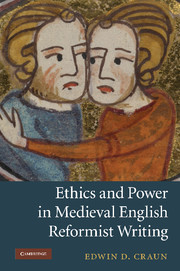Book contents
- Frontmatter
- Contents
- Acknowledgments
- Editorial practices, translations, abbreviations
- Introduction
- 1 Universalizing correction as a moral practice
- 2 Negotiating contrary things
- 3 Managing the rhetoric of reproof: the B-version of Piers Plowman
- 4 John Wyclif: disciplining the English clergy and the Pope
- 5 Wycliffites under oppression: fraternal correction as polemical weapon
- 6 Lancastrian reformist lives: toeing the line while stepping over it
- Postscript
- Notes
- Bibliography
- Index
- CAMBRIDGE STUDIES IN MEDIEVAL LETERATURE
3 - Managing the rhetoric of reproof: the B-version of Piers Plowman
Published online by Cambridge University Press: 15 April 2010
- Frontmatter
- Contents
- Acknowledgments
- Editorial practices, translations, abbreviations
- Introduction
- 1 Universalizing correction as a moral practice
- 2 Negotiating contrary things
- 3 Managing the rhetoric of reproof: the B-version of Piers Plowman
- 4 John Wyclif: disciplining the English clergy and the Pope
- 5 Wycliffites under oppression: fraternal correction as polemical weapon
- 6 Lancastrian reformist lives: toeing the line while stepping over it
- Postscript
- Notes
- Bibliography
- Index
- CAMBRIDGE STUDIES IN MEDIEVAL LETERATURE
Summary
Reformist discourses crowd Piers Plowman, moving in and out of the seven dreams and twenty narrative passūs of its B-version. Satiric, pastoral, interclerical and anticlerical, Franciscan, apocalyptic – each discourse is voiced recurrently, by different figures and by the wandering dreamer/narrator himself, an open persona in a world of contending discourses and contentious interlocutors and of the often contrary texts shaping both. Each becomes part of a search that, in David Aers's words, “resists attempts to generate a ‘spirituality’ abstracted from the embodied practices of the virtues and vices.” As Piers explores – and activates – the potential of each discourse to reform the individual, social and economic relations, the Church, and sometimes the state, each one's contrarieties and limitations, as well as its promise, begin to appear. Some discourses endure to the end of the poem; others are rejected; some recur in several dreams, their potential coming to matter at specific points in the narrator's journeys. Among the last is discourse on fraternal correction as a moral practice, shaped by moral theologians and canonists intent on reforming the conduct of individuals, lay people and clerics alike, then transmitted by pastoral text and sermon. Piers Plowman's open field of multiple discourses provides fertile ground for the interplay of seemingly conflicting, even contrary, goods, texts, and voices that we find in pastoral discourse – and for its many ways of negotiating them.
- Type
- Chapter
- Information
- Ethics and Power in Medieval English Reformist Writing , pp. 57 - 84Publisher: Cambridge University PressPrint publication year: 2010

